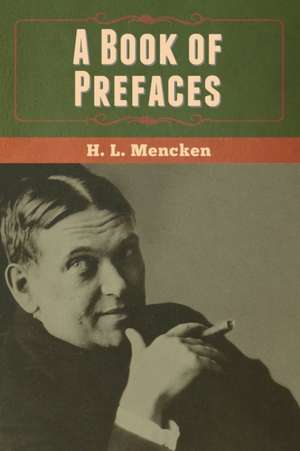A Book of Prefaces
Autor H. L. Menckenen Limba Engleză Paperback – 21 aug 2020
| Toate formatele și edițiile | Preț | Express |
|---|---|---|
| Paperback (3) | 48.68 lei 3-5 săpt. | |
| CreateSpace Independent Publishing Platform – | 48.68 lei 3-5 săpt. | |
| Bibliotech Press – 21 aug 2020 | 98.28 lei 6-8 săpt. | |
| LIGHTNING SOURCE INC – 26 mai 2018 | 135.65 lei 17-23 zile |
Preț: 98.28 lei
Nou
Puncte Express: 147
Preț estimativ în valută:
18.81€ • 20.49$ • 15.85£
18.81€ • 20.49$ • 15.85£
Carte tipărită la comandă
Livrare economică 23 aprilie-07 mai
Preluare comenzi: 021 569.72.76
Specificații
ISBN-13: 9781647999872
ISBN-10: 1647999871
Pagini: 138
Dimensiuni: 152 x 229 x 8 mm
Greutate: 0.18 kg
Editura: Bibliotech Press
ISBN-10: 1647999871
Pagini: 138
Dimensiuni: 152 x 229 x 8 mm
Greutate: 0.18 kg
Editura: Bibliotech Press
Notă biografică
H. L. Mencken was an American journalist, essayist, satirist, cultural critic, and expert on American English. He lived from September 12, 1880, until January 29, 1956. He made extensive observations about the social scene, literature, music, well-known politicians, and modern movements. He also attracted notice for his parody reporting on the Scopes Trial, which he nicknamed the "Monkey Trial". Mencken is renowned as a scholar for his work on The American Language, a multi-volume examination of American English dialects. He was a vocal opponent of representative democracy, which he saw as a system in which weaker individuals ruled their superiors, and organized religion. He was a fan of the German philosopher Friedrich Nietzsche. Mencken opposed osteopathy and chiropractic while supporting scientific advancement. He openly criticized economics as well. For six years, Mencken worked as a reporter for the Herald. The newspaper was bought in June 1906, less than two and a half years after the Great Baltimore Fire, by Gen. Felix Agnus, the rival owner, and publisher of The Baltimore American, the town's oldest (since 1773) and largest daily, and Charles H. Grasty, the owner, and editor of The News since 1892.
